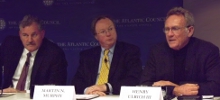
On December 13, the Michael S. Ansari Africa Center hosted a panel discussion on “Piracy in the Gulf of Guinea: A Growing Threat to Transatlantic Security,” chaired by Atlantic Council Board Director Admiral Henry G. Ulrich III, USN (Ret.).
Following introductory remarks by Ansari Center director J. Peter Pham, presentations were made by Daniel Whiteneck, operations and tactic analysis research analyst at the Center for Naval Analyses (CNA); Kevin Doherty, president of Nexus Consulting; Stan Ayscue, vice-president of Securewest International; Phillip J. Heyl, chief of the Air and Maritime Branch at the US Africa Command (AFRICOM); and Martin N. Murphy, resident senior fellow in the Ansari Africa Center.
While piracy off Somalia is receiving considerable public attention—and consuming significant military and diplomatic resources from the United States and other countries—it is the growing number of pirate attacks in the Gulf of Guinea, off the coast of Nigeria and its neighbors, that actually presents the more direct threat to the economic security of America and its transatlantic partners. Nigeria’s failure to deal adequately with the revolt in the Niger Delta and well as the rising terror threat in northern regions from Boko Haram and other Islamist groups have caused some to worry that Africa’s most populous country a failed state in the making. Panelists discussed the recent history of maritime depredation in the Gulf of Guinea and what trends indicate might be developing, the role of naval force and private armed security in the protection of shipping, the potential impact of Nigeria’s growing internal turmoil on regional maritime security, and how the US and its allies should respond to these threats.
AUDIO (.mp3)
MEDIA MENTIONS
- Piracy Rises in Oil-Rich West Africa – Nico Colombant, Voice of America
